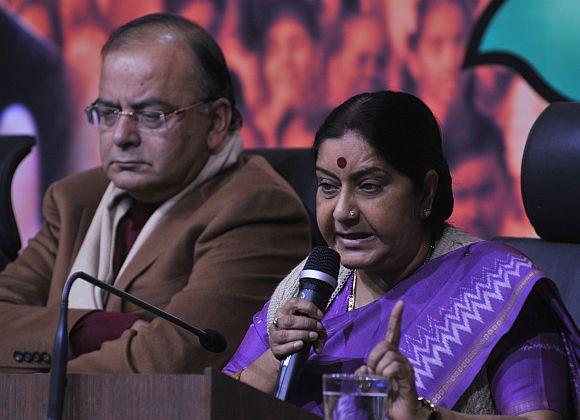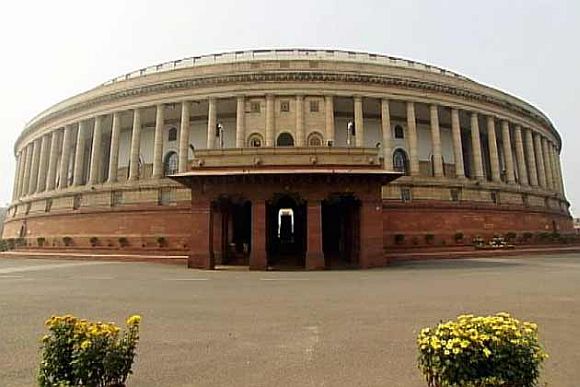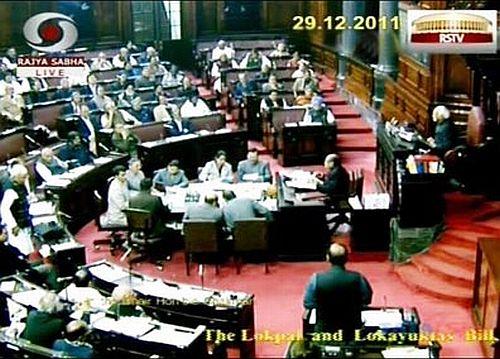 | « Back to article | Print this article |
BJP cries foul before President; wants Lokpal session reconvened
Bharatiya Janata Party leaders met President Pratibha Patil on Thursday to complain about "subversion" of Parliament over Lokpal issue and sought her intervention to re-convene the House to enable voting in Rajya Sabha on the crucial bill.
BJP leaders led by L K Advani and party president Nitin Gadkari and leaders of opposition in both Houses Arun Jaitley and Sushma Swaraj met President Pratibha Patil and handed over a memorandum to her, seeking the special Parliament session.
The party charged the government with "complete subversion of Indian Parliamentary institution" by not holding a vote in Rajya Sabha on the contentious Lokpal Bill.
"We have suggested to the President that as a part of Parliament, she should take the initiative and give a concrete suggestion for re-convening the Parliament session and hold voting which was postponed earlier for creation of a strong Lokpal," said BJP leader Arun Jaitley.
With inputs from Onkar Singh in New Delhi
Click on NEXT to read further...
BJP cries foul before President; wants Lokpal session reconvened
The President has said that she would examine various aspects on the matter before taking any action, he said.
"We have sought the President's intervention and expressed our complaint and dissatisfaction on the events that took place in Rajya Sabha on the night of December 29," Advani told media persons after meeting Patil.
The BJP memorandum states that "when such a breakdown of the constitutional machinery takes place, the President as a protector and guardian of Indian Constitution must act".
"The President could advise the government to re-convene the Session and immediately take a vote. The Government must be asked to explain the reasons why the House was disturbed through such contrived disturbances."
Click on NEXT to read further...
BJP cries foul before President; wants Lokpal session reconvened
Earlier, Jaitley said the government had resorted to "contrived disturbances" in the house in order to prevent a vote on Lokpal Bill in Rajya Sabha.
The opposition had moved many amendments some of which were common amendments moved by several opposition parties, which infact constituted the majority in Rajya Sabha, he said.
These common amendments included that the investigating agency with Lokpal be made independent, and also process of appointment and removal of Lokpal be freed of government influence, he said.
"The government kept trying for the support of parties, when it was clear that the government did not have a majority it contrived disturbances, to avoid voting on the Bill," Jaitley charged, adding "it was an open secret that the government, for the first time in the history of Parliament, contrived disturbances to avoid a vote".
Click on NEXT to read further...
BJP cries foul before President; wants Lokpal session reconvened
In its memorandum, the BJP stated that the government benches "engineered" disturbances, initially through a friendly party and subsequently by its own members and these disturbances were "contrived" to earn an adjournment so that a voting could be avoided.
"When Government disturbs proceedings and the House is adjourned, it sets a terrible precedent which would always be pointed out by potential disturbers. The legitimacy of the House to question such future disturbances is dented. The effort to avoid a vote through contrived disturbances is a clear subversion of parliamentary democracy. A government which avoids a vote has no moral authority to continue in office", the BJP memorandum states.
Click on NEXT to go further...
Full text of BJP memorandum to President Patil
Full text of BJP's memorandum to President Pratibha Patil
Mahamahim Rashtrapati ji,
We, the Members of Parliament belonging to the Bharatiya Janata Party, are constrained to encroach upon your time to place our grievance with regard to the complete subversion of Indian Parliament on the midnight of 29th December, 2011.
The Winter Session of Parliament was extended for 3 days from the 27thto 29th of December, 2011 for the purpose of considering and passing "The Lokpal and the Lokayukta Bill, 2011". The Bill had been passed in the Lok Sabha on the 27th December, 2011. The Rajya Sabha sat throughout the following day i.e., on 28th December, 2011 and Members repeatedly mentioned as to why the agenda for the Bill was not being circulated for discussion. We understand that Your Excellency had approved the consideration of the Bill by the Rajya Sabha in the afternoon of 28th December itself. However, the Government had other ideas. Since they did not have the majority to pass the said Bill, the Government's strategy was to either manage and win over some smaller political parties or, alternatively, to somehow drag the discussion of the Bill and not allow its passage. It was as a part of the strategy that the Bill was not taken up for consideration on 28th December, 2011.
The discussion started at 11 a.m. in the morning of the 29th December, 2011. It was scheduled to be an 8-hour discussion which would have ended by 7 p.m. and a vote taken thereafter. Several Members who had to vote had proposed certain amendments to the Bill. Most opposition parties and certain other smaller parties had made it clear in the course of the discussion that they would insist on three amendments, virtually common in nature, to the Bill being considered for a vote. The BJP itself had made it clear that they would support the Bill as amended by those three amendments. These parties which supported the three amendments themselves constituted the majority of the House. Clearly, the opposition was in a majority and the Government in a minority.
It became an open secret around 6 p.m. that the Government had failed to muster support of any of these smaller parties in the Rajya Sabha. Its' strategy now was to disturb the House and enforce its adjournment so that a vote could be avoided. The Government wanted to claim extra time in order to ensure that the political turn of events might help it to manipulate a majority. Besides prolonging the discussion, the Government benches started raising an objection that the midnight was approaching and the vote could not be taken.
Rule 13 of the Rules of Procedure and Conduct of Business in the Council of States clearly states that a sitting of Council should conclude at such hour as the Chairman may direct. There have been on several occasions sittings of the Rajya Sabha continuing beyond midnight. Objections have been raised whether the day's sitting would end at 12 of the midnight. The Chair has consistently ruled relying on Rule 13 that the parliamentary day continues as long as the agenda of the day is not exhausted. Thus, 22nd December 1980, 17th September 1981, 8th May 1986, 29th December 1986, 14th December 1987, 11th May 1988, 12thOctober 1989, 13th October 1989 and 4th June 1991 are some illustrations when the House has sat beyond midnight. Obviously, the objection of the Government was not sustainable.
The Government benches then engineered disturbances; initially through a friendly party and subsequently by its own members. These disturbances were contrived to earn an adjournment so that a voting could be avoided. When governments disturb proceedings and the House is adjourned, it sets a terrible precedent which would always be pointed out by potential disturbers. The legitimacy of the House to question such future disturbances is dented. The effort to avoid a vote through contrived disturbances is a clear subversion of parliamentary democracy. A government which avoids a vote has no moral authority to continue in office. If a state government avoided a vote in a legislature in this manner, it could be argued that governance is not being carried on in accordance with the Constitution. How does the Indian political and constitutional system countenance a central government which does the same? When such a breakdown of the constitutional machinery takes place, the President as a protector and guardian of Indian Constitution must act. The President could advise the government to re-convene the Session and immediately take a vote. The government must be asked to explain the reasons why the House was disturbed through such contrived disturbances.
This incident has left a blot on India's parliamentary democracy. The nation looks up to Your Excellency, The President, to restore the credibility of India's Parliament.
Yours faithfully,
Other Top photo features
Click on MORE to see another set of PHOTO features...





